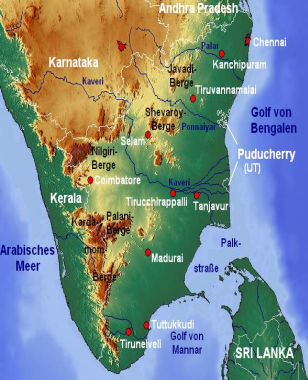Ahmedabad
(Head Office)Address : 506, 3rd EYE THREE (III), Opp. Induben Khakhrawala, Girish Cold Drink Cross Road, CG Road, Navrangpura, Ahmedabad, 380009.
Mobile : 8469231587 / 9586028957
Telephone : 079-40098991
E-mail: dics.upsc@gmail.com

Soil Erosion in Western Ghats
News: Recently, IIT Bombay study finds 94% soil erosion rise in Western Ghats region from 1990 to 2020, indicating alarming environmental degradation.
Background of Western Ghats:
• The Western Ghats, also known as the Sahyadri Mountain Range, is a UNESCO World Heritage Site and one of Earths 36 biodiversity hotspots.
• It spans six Indian states: Tamil Nadu, Kerala, Karnataka, Goa, Maharashtra, and Gujarat.
• Notably, it harbors national parks, wildlife sanctuaries, and reserve forests.
• Red soils predominate on the steep slopes of the western side with high rainfall.
• Western Ghats in Gujarat start near the Tapi River.
• The Ministry of Environment and Forests (MoEF) formed two committees:
• Western Ghats Ecology Expert Panel (WGEEP) chaired by Prof. Madhav Gadgil.
• High-Level Working Group (HLWG) led by Dr. K. Kasturirangan, tasked with reviewing WGEEP recommendations.
Key Findings:
• The research utilized remote sensing tools such as LANDSAT-8 and Digital Elevation
Model (DEM), in addition to rainfall data.
• The Universal Soil Loss Equation (USLE) method was employed to calculate soil loss rates.
• Findings indicated a concerning trend: soil erosion in the Western Ghats Region rose
from 32.3 to 62.7 tons per hectare annually between 1990 and 2020.
• This represents a substantial 94% increase, demonstrating a consistent upward trajectory.
• On a state-by-state basis, Tamil Nadu experienced the most significant surge at
121%, followed by Gujarat (119%), Maharashtra (97%), Kerala (90%), Goa (80%), and Karnataka (56%).
• The rapid rates of soil erosion occurring in the Western Ghats region are not sustainable and pose a significant threat to biodiversity. If left unchecked, this trend
could result in irreversible damage to the ecosystem.
Impact of Soil Erosion in Western Ghats:
• The Western Ghats houses numerous globally threatened plant and animal species.
• Threats include urbanization, agriculture expansion, grazing, forest loss, habitat fragmentation, invasive species, encroachment, conversion, and climate change.
• Soil loss diminishes land fertility and reduces soils water-holding capacity.
• This impacts the entire ecosystem negatively.
• Increasing soil erosion poses a severe threat to the regions vital biodiversity.
Significance of Western Ghats:
• Hydrological:
- Feeds major rivers like Godavari, Krishna, and Kaveri.
- Supplies water to peninsular Indian states.
• Climate:
- Influences Indian monsoon patterns.
- Acts as a barrier to monsoon winds.
- Helps sequester CO2, impacting climate change.
• Biodiversity:
- One of the eight biodiversity hotspots.
- High plant and animal diversity and endemism.
• Economic:
- Rich in ores like iron, manganese, and bauxite.
- Supports forest-based industries.
- Major source of plantation crops like pepper, cardamom, tea, coffee, oil palm, and rubber.
• Home to Indigenous Tribes:
- Hosts indigenous tribes and vulnerable groups.
- Communities rely on forest produce for sustenance.
• Tourism and Pilgrimage:
- Tourist centers like Ooty and Thekkady.
- Important pilgrimage sites like Sabarimalai, Madeveshwaramalai, and Mahabaleshwar.
Conservation Efforts for Western Ghats:
Committees for Western Ghats:
• Gadgil Committee (2011):
- Also known as the Western Ghats Ecology Expert Panel (WGEEP).
- Recommended declaring the entire Western Ghats as Ecologically Sensitive Areas (ESA).
- Proposed limited development in graded zones.
• Kasturirangan Committee (2013):
- Aimed to balance development and environmental protection.
- Recommended designating only 37% of the total area of Western Ghats as ESA.
- Called for a complete ban on mining, quarrying, and sand mining within ESA

Address : 506, 3rd EYE THREE (III), Opp. Induben Khakhrawala, Girish Cold Drink Cross Road, CG Road, Navrangpura, Ahmedabad, 380009.
Mobile : 8469231587 / 9586028957
Telephone : 079-40098991
E-mail: dics.upsc@gmail.com
Address: A-306, The Landmark, Urjanagar-1, Opp. Spicy Street, Kudasan – Por Road, Kudasan, Gandhinagar – 382421
Mobile : 9723832444 / 9723932444
E-mail: dics.gnagar@gmail.com
Address: 2nd Floor, 9 Shivali Society, L&T Circle, opp. Ratri Bazar, Karelibaugh, Vadodara, 390018
Mobile : 9725692037 / 9725692054
E-mail: dics.vadodara@gmail.com
Address: 403, Raj Victoria, Opp. Pal Walkway, Near Galaxy Circle, Pal, Surat-394510
Mobile : 8401031583 / 8401031587
E-mail: dics.surat@gmail.com
Address: 303,305 K 158 Complex Above Magson, Sindhubhavan Road Ahmedabad-380059
Mobile : 9974751177 / 8469231587
E-mail: dicssbr@gmail.com
Address: 57/17, 2nd Floor, Old Rajinder Nagar Market, Bada Bazaar Marg, Delhi-60
Mobile : 9104830862 / 9104830865
E-mail: dics.newdelhi@gmail.com